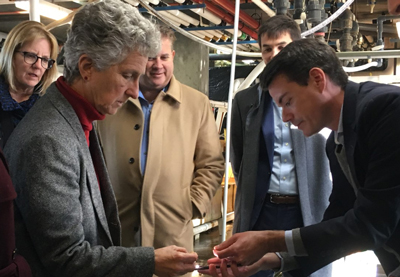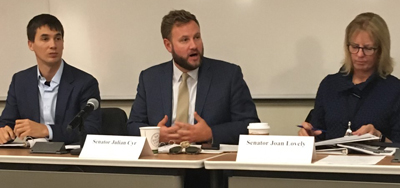State’s Ocean Acidification Commission Rolls Up Its Sleeves at MBL Meeting

Intense downpours, heat waves, and flooding are now the most visible signs of climate change in the New England region. But less visible impacts also pose a threat to the region’s economy and resiliency.
 Rep. Sarah Peake, a member of the Massachusetts Ocean Acidification commission, and MBL's Sebastien Laye illuminate a skate egg case in the MBL's Marine Resources Center. Credit: Jane Marks
Rep. Sarah Peake, a member of the Massachusetts Ocean Acidification commission, and MBL's Sebastien Laye illuminate a skate egg case in the MBL's Marine Resources Center. Credit: Jane MarksThe first meeting of the Massachusetts Commission on Ocean Acidification was held at the Marine Biological Laboratory (MBL) on Friday, kicking off a state investigation of climate-related changes in ocean chemistry that can endanger our important shellfishing and aquaculture industries.
Cape and Islands Sen. Julian Cyr led the meeting with Rep. Dylan Fernandes, who represents Woods Hole. The commission includes legislators, commercial fishers and shellfishers, scientists including MBL’s Anne Giblin, and representatives from environmental agencies and groups.
The commission will report in December 2020 on the extent of coastal and ocean acidification in Massachusetts waters; the factors contributing to it; how to mitigate it; and recommendations to the Legislature for supporting future research and public outreach on the issue.
The members heard a stark overview of the ocean acidification problem on Friday from Jennie Rheuban, a research associate at Woods Hole Oceanographic Institution.
Atmospheric carbon dioxide (CO2) concentrations have been rising since the Industrial Revolution, Rheuban said, and a quarter of that CO2 ends up in the ocean. This upsets the equilibrium of three forms of inorganic carbon naturally found in seawater, resulting in boosted acidity. The natural buffering capacity of seawater can neutralize some of this acidification, but New England’s cold water has a lower buffering capacity than most regions, she said, “leading to more risk for New England stakeholders.”
 The Mass. Commission on Ocean Acidification begins its first meeting at MBL with (from left) Rep. Dylan Fernandes, Sen. Julian Cyr and Sen. Joan Lovely. Credit: Jane Marks
The Mass. Commission on Ocean Acidification begins its first meeting at MBL with (from left) Rep. Dylan Fernandes, Sen. Julian Cyr and Sen. Joan Lovely. Credit: Jane MarksThis imbalance in ocean chemistry is known to be deleterious to shellfish. Acidification inhibits their ability to make a shell and can slow their growth, so it takes longer to reach harvestable size. “That has major implications for our aquaculture and shellfish industries,” Rheuban said.
The situation in coastal waters “is way more complicated” than in open ocean, where acidification is primarily driven by atmospheric CO2, she said. Along the coast, “you can have point sources of acidification, such as industrial effluents or wastewater discharge.” Freshwater discharge from rivers or storm water also increases coastal acidification, especially if the freshwater has a low buffering capacity.
Also, “Nutrient pollution is a huge problem that is driving acidification in the coastal environment,” Rheuban said. When nutrients from fertilizers or septic systems run off from land into coastal waters, it causes algal blooms that can lead to oxygen depletion, killing marine life and habitats. This process also produces CO2 . “Where you have nutrient pollution, you will also likely have acidification. They go hand in hand,” she said.
An unfortunate “triple whammy” intensifies the ocean acidification problem in Southeastern Massachusetts, she said. First, many of its estuaries are already suffering from nutrient pollution. Second, the freshwater entering the estuaries has a low buffering capacity. And third, the region has a very heavy reliance on shellfish species that are sensitive to acidification, influencing its economy. “This area is quite vulnerable for these reasons. We have both environmental and social vulnerability.”
Several potential mitigation strategies for coastal acidification have been proposed, which the commission may consider. “Many of these relate to enhancing coastal resiliency by reducing nutrient pollution,” Rheuban said. Buffering seawater before it enters aquaculture sites is another idea.
The next meeting of the commission will be held on February 7 on the North Shore. Meetings are open to the public. For more information, go to malegislature.gov